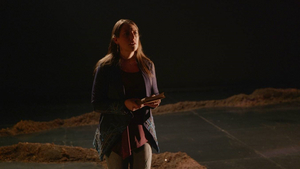Review: WHERE WE BELONG at Woolly Mammoth Theatre
Brilliant analysis of colonialism, Shakespeare and Native issues.

It's becoming common for theaters to pause before each production and include, alongside the usual cell phone reminders, a land acknowledgement, recognizing indigenous people that came before.
Madeline Sayet goes well beyond that in her exceptional solo piece "Where We Belong." A hit at the Globe in London, it's getting its filmed world premiere through a streamed co-production of Woolly Mammoth Theatre Company and the Folger Shakespeare Library.
What would seem an unusual collaboration of esteemed local stages is perfectly suited for Sayet's personal, poetic story of taking her Mohegan tribal roots to England to study Shakespeare. It wasn't just Shakespeare on her mind, though.
She considers the very survival of her tribe and its language in the face of the celebrated bard with the best words. She rethinks and reclaims Caliban, a character from her favorite Shakespeare work, "The Tempest," not as a monster but an indigenous person who reclaims his language.
All the while, she feels as out of place in contemporary England as she does in modern day America and is especially confronted with the stark colonialism that continues to flourish in today's un-self aware UK amid the usual tangle of borders and border crossings.
Impassioned, intellectually curious and indignant at history, Sayet frames her monologue in her indigenous name, for blackbird.
As such, director Mei Ann Teo, who also created the Globe performance as part of the 2019 Border Crossings' ORIGINS festival, treats the filmed performance as a film, enabling Sayet's bird to flit and fly and soar as the film and lights around her help create the swirling skyward trajectory.
Hao Bai's sparse but effective set design is built on low mounds of dirt that represent the land and abstract lights above her head subbing for the cosmos, except when perpendicular fluorescent lights descend to signify the society's imposing bureaucracy and particularly the chilly categorization of the British Museum, where thousands of indigenous bones are held with no intention of repatriation.
Sayet is convinced of the power of stories in general, and her own remarkable tale is that of her own tribe, which made the decision to side with the British in fighting the neighboring Pequot, who ended up slaughtered and burned out their homes.
In Sayet's world, her mother is not just an admonishing matriarch, but the tribe's reigning medicine woman - a link in the remarkable story of survival that is part of the Mohegan story (It is the eventual success of their famous late 20th century casino that funds her education in England).
One person shows can get claustrophobic, or suffer from the lack of other dialog, but "Where We Belong" fairly giitters with its well-honed presentation, interlocking stories, time travel of past history and its interlocking with current issues. Like the namesake of its author, it flies.
As electric as this would be performed live, the filmed version - which will also be a part of the International Festival of Arts & Ideas in New Haven, where Sayet is executive director of the Yale Indigenous Performing Arts Program - is among the best of all of the various filmed performances made necessary by COVID-19 restrictions.
Captured so very well, it can now stand as among the great artistic achievements during the pandemic (and didn't her hero Shakespeare issue "King Lear" during his pandemic?).
Any limitations for having it on film only is overcome by the possibilities of so many people being able to see it, just as fresh, immediate and important, for decades to come.
Running time: About 80 minutes, no intermission.
Photo credit: Madeline Sayet in "Where We Belong." Photo by Jon Bucklund.
"Where We Belong" continues through July 11 through the Woolly Mammoth Theatre Company in association with the Folger Shakespeare Library. Closed captioned versions are available. Tickets are available at 202-393-3939 or online.
The performance is also featured as part of the International Festival of Arts & Ideas 2021 June 24-27. More information online.
Reader Reviews

Videos

